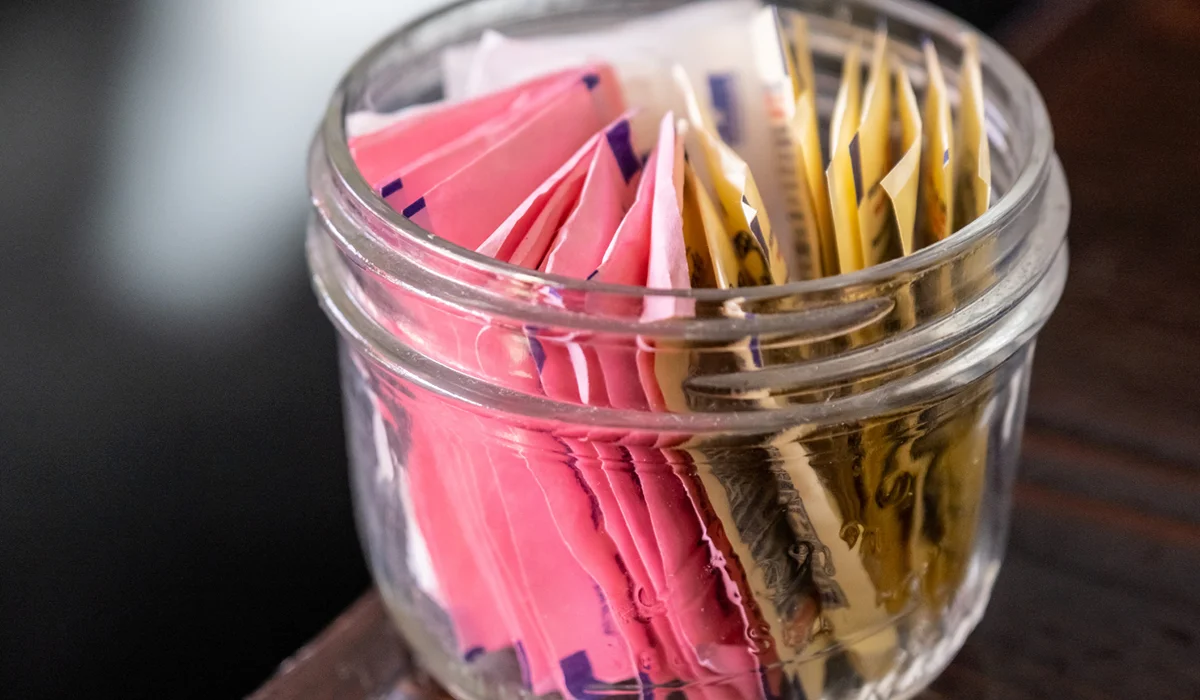People everywhere turn to artificial sweeteners to reduce sugar while keeping things sweet, but these alternatives might not be the guilt-free option we once thought. Recent research points to these sugar substitutes quietly disrupting our gut microbiome, despite helping many reduce their calorie intake.
Many of us have grabbed products with saccharin, aspartame, and sucralose off store shelves without knowing what they might do to our bodies. The debate about artificial sweeteners’ safety has produced mixed results until recently. Scientists have found that there was a troubling connection between these compounds and gut health. These sweeteners can throw off the crucial bacterial balance that controls everything from how we digest food to our immune response. So health experts now warn against specific artificial sweeteners based on this new evidence.
This piece will take you through the basics of artificial sweeteners, their effects on your digestive system, and signs that your body might be rejecting them. You’ll also learn practical ways to protect your gut health. Let’s head over to why that zero-calorie sweetener might not be the miracle solution it seems.
What are artificial sweeteners and how do they work?
Sugar substitutes give you sweetness without calories. These alternatives match sugar’s taste that many people love, but they won’t add to your daily calorie count.
Definition and common uses
Sugar substitutes (also called non-nutritive sweeteners, high-intensity sweeteners, or artificial sweeteners) taste just like sugar [1]. Labs blend most of these chemically, though some come from natural sources like plants [2]. A tiny amount goes a long way since these sweeteners pack 200 to 20,000 times more sweetness than regular table sugar [3].
You’ll spot these sweeteners in many “sugar-free” or “diet” products such as:
- Soft drinks and flavored beverages
- Baked goods and desserts
- Candy and chewing gum
- Dairy products and yogurts
- Toothpaste and mouthwash
- Ready meals and processed foods
Artificial sweeteners list and types
The FDA has given its stamp of approval to six main artificial sweeteners as food additives in the United States [3]:
- Aspartame (NutraSweet®, Equal®) – Approximately 200 times sweeter than sugar
- Saccharin (Sweet’N Low®, Sweet Twin®) – 200 to 700 times sweeter than sugar
- Sucralose (Splenda®) – About 600 times sweeter than sugar
- Acesulfame potassium (Ace-K, Sunett®, Sweet One®) – Roughly 200 times sweeter than sugar
- Neotame (Newtame®) – 7,000 to 13,000 times sweeter than sugar
- Advantame – Approximately 20,000 times sweeter than sugar
Plant-based sweeteners like stevia extracts (Truvia®, PureVia®) and monk fruit extract have also earned “Generally Recognized as Safe” (GRAS) status [3].
How they mimic sugar in the body
These sweeteners work by triggering the same taste receptors that respond to natural sugars. Sweet taste receptors (T1R2/T1R3) on your tongue pick up these compounds and signal your brain to create that sweet sensation [4].
Your digestive system has these same receptors throughout, including cells that make important hormones like GLP-1 [5]. This explains why these sweeteners can affect more than just taste.
Your body handles these substances differently from regular sugar. These sweeteners might light up your taste buds, but your body doesn’t use them for energy [1]. Research shows they might bind to sweet receptors differently than natural sugars, which could lead to weaker reward signals in your brain [6].
This unique processing helps explain why sweet alternatives don’t prepare your digestive system to handle calories like regular sugar does [7].
How artificial sweeteners affect your gut microbiome
Your gut houses trillions of microorganisms that substantially influence your health. These tiny inhabitants are vital to your digestion, immunity, and mood regulation. Scientists have found that artificial sweeteners might disrupt this delicate ecosystem in ways we’re just starting to grasp.
The role of gut bacteria in digestion
Your digestive tract’s microbiome weighs about three pounds, mostly in your large intestine. These microorganisms handle tasks that human cells can’t do on their own. They help break down complex carbohydrates, create essential nutrients like vitamin K, and turn food into short-chain fatty acids that feed your colon cells [8]. Bacteroidetes and Firmicutes, your gut’s main bacterial groups, team up through complex metabolic processes to digest fiber and other nutrients [9].
New research on microbiome disruption
Scientists have found that artificial sweeteners can change both the makeup and function of gut bacteria. Clinical trials showed saccharin and sucralose hurt glycemic tolerance by changing the microbiome [10]. A newer study, published by the Weizmann Institute of Science, revealed that sweeteners like aspartame, sucralose, saccharin, and stevia changed participants’ intestinal bacteria substantially, especially when they consumed sucralose and saccharin [11].
These changes went beyond the large intestine. Researchers at Cedars-Sinai found major differences in both stool and small intestine bacterial diversity after people consumed non-sugar sweeteners [12]. Aspartame consumption boosted bacterial pathways linked to cylindrospermopsin, a potential toxin that can harm your liver and nervous system [12].
Why balance in gut flora matters
Your gut microbiome’s disruption can lead to widespread problems. Research connects bacterial imbalances to inflammatory bowel disease, obesity, diabetes, and heart issues [13]. The Israeli research team concluded that artificial sweeteners “may have directly contributed to improving the exact epidemic that they themselves were intended to fight” [14].
Research suggests artificial sweeteners might help grow gut bacteria that pull more energy from food and store it as fat [14]. This explains why people who switch to artificial sweeteners rarely lose weight as expected [14].
Signs your gut may be reacting to artificial sweeteners
Your body might send warning signals if you keep taking foods with sugar substitutes. People often experience negative reactions but don’t connect them to what they eat. Early detection of these symptoms helps you make better choices about your diet.
Digestive issues like bloating or gas
The first sign of sweetener sensitivity usually shows up in your digestive system. Your body can’t fully digest many artificial sweeteners, which leads to uncomfortable symptoms [15]. Gut bacteria in the large intestine ferment these sugar substitutes, especially polyols like sorbitol, mannitol, and xylitol. This creates excess gas [16].
Watch for these common digestive reactions:
- Your body feels bloated and uncomfortable within hours after eating [17]
- You experience excessive gas or flatulence [18]
- You feel general stomach pain or cramping [17]
Changes in bowel habits
Artificial sweeteners can change your regular bowel patterns by a lot. People who use these products often report ongoing GI issues and different bowel habits [19]. You might experience:
Diarrhea or constipation—these symptoms often link to IBS [15]. Products with sweeteners even come with warnings about what it all means when you eat too much, especially the “laxative effects” [18].
Increased sugar cravings
The sort of thing I love about this is how zero-calorie sweeteners actually make you want more real sugar. Scientists found these sweeteners can break the connection between sweetness and calories in your brain [3]. This makes you crave more sweets and choose sugary foods instead of healthy ones [3].
Research shows these sweeteners trigger hunger hormones like ghrelin that increase food cravings [16]. This explains why the San Antonio Heart Study found people drinking more than 21 diet drinks weekly were twice as likely to gain weight compared to those who didn’t [3].
Mood or energy fluctuations
Your gut’s connection to your brain means sweeteners affect more than digestion. Studies linking artificial sweeteners to mood changes discovered that high-aspartame diets caused more depression and irritability symptoms [20].
These negative effects happened even when people stayed below the daily aspartame limit [20]. Scientists think aspartame disrupts serotonin and dopamine production while raising stress hormone (cortisol) levels [20].
How to reduce the impact of artificial sweeteners
New research shows how artificial sweeteners affect your gut health. You can make smart changes to your diet that will help reduce their negative effects. The good news is you can still enjoy sweet foods while cutting back on these substances.
List of artificial sweeteners to avoid
The FDA has given its approval to six high-intensity artificial sweeteners. Research suggests these sweeteners might harm your gut bacteria:
- Aspartame (Equal®, NutraSweet®)
- Sucralose (Splenda®)
- Saccharin (Sweet’N Low®)
- Acesulfame potassium (Ace-K)
- Neotame
- Advantame
Scientists have found erythritol especially concerning. Research links it to higher risks of heart attack, stroke, and blood clotting. The World Health Organization now tells people not to use non-nutritive sweeteners for weight control. Studies show long-term use might increase your risk of type 2 diabetes and heart diseases.
Switching to natural alternatives
Natural sweeteners can give you better nutritional benefits than artificial ones.
Maple syrup has compounds that help slow down blood sugar absorption and works as an antioxidant. Honey comes packed with antimicrobial benefits, minerals, and vitamins. Pure stevia (without erythritol) and monk fruit extract work well as zero-calorie natural options. Just remember to use them in moderation.
Reading food labels carefully
Take a good look at ingredient lists beyond “sugar-free” claims. Many products labeled “no artificial sweeteners” mix stevia with erythritol. Watch out for ingredients ending in “-ose” (dextrose, fructose) and terms like “corn sweetener” or “high-fructose corn syrup.”
Limiting processed foods
Processed foods often pack high amounts of sugar and artificial sweeteners. Home-cooked meals with whole ingredients let you control what goes into your digestive system better.
Supporting gut health with probiotics
Artificial sweeteners can mess with your beneficial gut bacteria. Probiotic-rich foods help restore balance in your system. Foods like yogurt, kefir, sauerkraut, and kimchi add good bacteria that support your digestive health and might help counter some negative effects of sweeteners.
Conclusion
Science continues to uncover more evidence about artificial sweeteners’ harmful effects on our gut microbiome. This piece shows how these zero-calorie alternatives throw off the delicate balance of bacteria we need for proper digestion, immunity, and mood regulation. The symptoms many people face—bloating, irregular bowel movements, increased sugar cravings, and energy swings—make more sense now with this research.
Artificial sweeteners promised guilt-free sweetness but created a different set of problems. Health professionals now question whether these compounds’ metabolic disruption might lead to the same health issues people try to avoid.
You can take practical steps to reduce your exposure to problematic sweeteners. Start by reading labels to spot hidden sweeteners in processed foods. Pure maple syrup, honey, or minimally processed stevia provide sweetness with fewer downsides. Probiotic-rich foods help support your gut bacteria and might offset some damage from earlier sweetener use.
Recent research shows our bodies work as complex ecosystems rather than simple calorie-processing machines. Next time you see that “diet” or “sugar-free” product, think about whether the trade-off helps your overall health. Your gut microbiome needs protection because it plays a key role in many bodily functions beyond digestion.
Better health often means questioning what we’ve always believed. Paying attention to your body’s response to artificial sweeteners can tell you more about your personal nutrition needs than any general dietary advice.
References
[1] – https://pmc.ncbi.nlm.nih.gov/articles/PMC3772345/
[2] – https://www.hopkinsmedicine.org/health/wellness-and-prevention/facts-about-sugar-and-sugar-substitutes
[3] – https://www.health.harvard.edu/blog/artificial-sweeteners-sugar-free-but-at-what-cost-201207165030
[4] – https://pmc.ncbi.nlm.nih.gov/articles/PMC4661139/
[5] – https://pmc.ncbi.nlm.nih.gov/articles/PMC2951976/
[6] – https://www.frontiersin.org/journals/nutrition/articles/10.3389/fnut.2020.598340/full
[7] – https://www.mdpi.com/2072-6643/16/18/3162
[8] – https://www.anl.gov/article/exploring-the-role-of-gut-bacteria-in-digestion
[9] – https://pmc.ncbi.nlm.nih.gov/articles/PMC4425030/
[10] – https://www.sciencedirect.com/science/article/pii/S0899900723002654
[11] – https://www.the-scientist.com/artificial-sweeteners-alter-gut-bacteria-in-humans-70395
[12] – https://www.cedars-sinai.org/newsroom/research-alert-artificial-sweeteners-significantly-alter-the-small-bowel-microbiome/
[13] – https://pmc.ncbi.nlm.nih.gov/articles/PMC10144565/
[14] – https://www.scientificamerican.com/article/artificial-sweeteners-may-change-our-gut-bacteria-in-dangerous-ways/
[15] – https://www.prevention.com/health/a60672537/artificial-sweeteners-may-damage-gut-health-study/
[16] – https://wild-dose.com/en-us/blogs/news/why-do-sweeteners-make-me-bloat?srsltid=AfmBOooYg1buNlJyOYGAdZ2WjuFqjlckEs3xBhvrH6Pjqdsx5rBZp7SU
[17] – https://www.wyndly.com/blogs/learn/intolerance-to-artificial-sweeteners?srsltid=AfmBOooShyBzhHY7QXRpBBbFzCOm5WBrX-NPz0_eKNIaphxZJaVUFl6o
[18] – https://www.yorktest.com/us/blog/unexpected-foods-bloating-gas/
[19] – https://www.healio.com/news/gastroenterology/20230511/artificial-sweeteners-linked-to-marked-effects-on-small-intestinal-microbiome
[20] – https://www.avogel.co.uk/health/stress-anxiety-low-mood/can-artificial-sweeteners-affect-mood/








